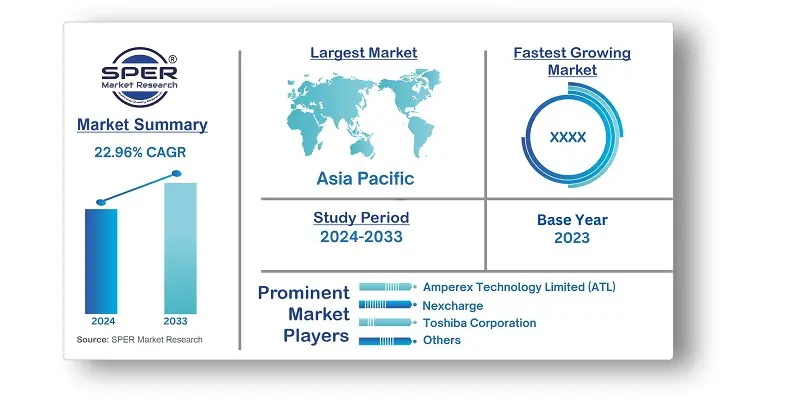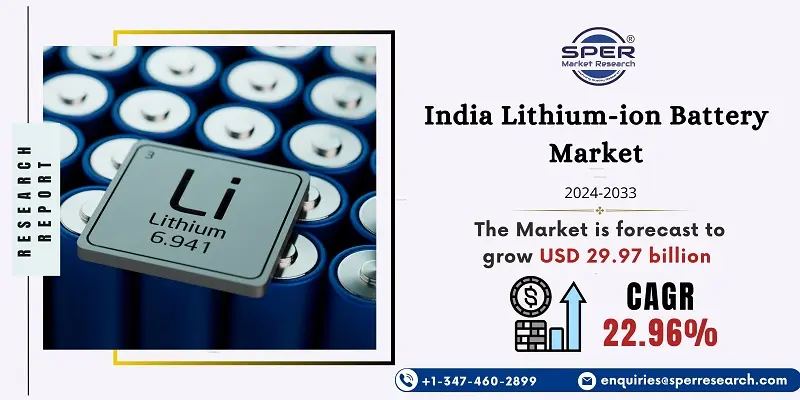
India Lithium-ion Battery Market Trends, Share, Size, Demand, Revenue and Future Outlook
India Lithium-ion Battery Market Growth, Size, Trends Analysis- By Application- Regional Outlook, Competitive Strategies and Segment Forecast to 2033
| Published: Nov-2024 | Report ID: POAE2499 | Pages: 1 - 110 | Formats*: |
| Category : Power & Energy | |||
- In March 2024, Maharatna PSU Indian Oil Corporation Ltd., the largest oil company in the country, and Panasonic Energy Co. Ltd., a division of the global electronics corporation Panasonic Group, based in Japan, would establish a joint venture to produce cylindrical lithium-ion batteries.
- In January 2024, Amara Raja Batteries Ltd., a manufacturer of automotive batteries, declared its intention to open a gigafactory by the end of 2025. In May 2023, the business lay the groundwork for one of its first gigafactories in Telangana, India's Mahbubnagar region. These facilities are anticipated to create battery packs and lithium cells with capacities of up to 5 GWh and 16 GWh, respectively.


| Report Metric | Details |
| Market size available for years | 2020-2033 |
| Base year considered | 2023 |
| Forecast period | 2024-2033 |
| Segments covered | By Application. |
| Regions covered | Eastern, Western, Northern, Southern. |
| Companies Covered | Amperex Technology Limited, Bharat Electronics Limited (BEL), Exicom Tele-Systems Limited, Future Hi-Tech Batteries, Inverted Energy Private Limited, Nexcharge (a joint venture between Leclanché and Exide Industries), TDS Lithium-Ion Battery Gujarat Private Limited (TDSG), Telemax India Industries Pvt. Ltd., Toshiba Corporation, and Vision Mechatronics Pvt. Ltd. |
- Consumer Electronics Manufacturers
- Electric Vehicle (EV) Manufacturers
- Renewable Energy Sector
- Telecommunications Industry
- Industrial and Power Backup Systems
- Electric Two-Wheeler Manufacturers
- Battery Recycling Companies
- Government and Regulatory Bodies
- Research and Development Institutions
| By Application: |
- India Lithium-ion Battery Market Size (FY’2024-FY’2033)
- Overview of India Lithium-ion Battery Market
- Segmentation of India Lithium-ion Battery Market By Application (Portable, Automotive, Others)
- Expansion Analysis of India Lithium-ion Battery Market
- Problems and Obstacles in India Lithium-ion Battery Market
- Competitive Landscape in the India Lithium-ion Battery Market
- Impact of COVID-19 and Demonetization on India Lithium-ion Battery Market
- Details on Current Investment in India Lithium-ion Battery Market
- Competitive Analysis of India Lithium-ion Battery Market
- Prominent Players in the India Lithium-ion Battery Market
- SWOT Analysis of India Lithium-ion Battery Market
- India Lithium-ion Battery Market Future Outlook and Projections (FY’2024-FY’2033)
- Recommendations from Analyst
1.1. Scope of the report1.2. Market segment analysis
2.1. Research data source
2.1.1. Secondary Data2.1.2. Primary Data2.1.3. SPERs internal database2.1.4. Premium insight from KOLs
2.2. Market size estimation
2.2.1. Top-down and Bottom-up approach
2.3. Data triangulation
4.1. Driver, Restraint, Opportunity and Challenges analysis
4.1.1. Drivers4.1.2. Restraints4.1.3. Opportunities4.1.4. Challenges
4.2. COVID-19 Impacts of the India Lithium-ion Battery Market
5.1. SWOT Analysis
5.1.1. Strengths5.1.2. Weaknesses5.1.3. Opportunities5.1.4. Threats
5.2. PESTEL Analysis
5.2.1. Political Landscape5.2.2. Economic Landscape5.2.3. Social Landscape5.2.4. Technological Landscape5.2.5. Environmental Landscape5.2.6. Legal Landscape
5.3. PORTERs Five Forces
5.3.1. Bargaining power of suppliers5.3.2. Bargaining power of buyers5.3.3. Threat of Substitute5.3.4. Threat of new entrant5.3.5. Competitive rivalry
5.4. Heat Map Analysis
6.1. India Lithium-ion Battery Market Manufacturing Base Distribution, Sales Area, Product Type6.2. Mergers & Acquisitions, Partnerships, Product Launch, and Collaboration in India Lithium-ion Battery Market
7.1. India Lithium-ion Battery Market Size, Share and Forecast, By Application, 2020-20267.2. India Lithium-ion Battery Market Size, Share and Forecast, By Application, 2027-20337.3. Portable7.4. Automotive7.5. Others
8.1. India Lithium-ion Battery Market Size and Market Share
9.1. India Lithium-ion Battery Market Size and Market Share By Region (2020-2026)9.2. India Lithium-ion Battery Market Size and Market Share By Region (2027-2033)9.3. Eastern Region9.4. Western Region9.5. Southern Region9.6. Northern Region
10.1. Amperex Technology Limited
10.1.1. Company details10.1.2. Financial outlook10.1.3. Product summary10.1.4. Recent developments
10.2. Bharat Electronics Limited (BEL)
10.2.1. Company details10.2.2. Financial outlook10.2.3. Product summary10.2.4. Recent developments
10.3. Exicom Tele-Systems Limited
10.3.1. Company details10.3.2. Financial outlook10.3.3. Product summary10.3.4. Recent developments
10.4. Future Hi-Tech Batteries
10.4.1. Company details10.4.2. Financial outlook10.4.3. Product summary10.4.4. Recent developments
10.5. Inverted Energy Private Limited
10.5.1. Company details10.5.2. Financial outlook10.5.3. Product summary10.5.4. Recent developments
10.6. Nexcharge (JV: Leclanché and Exide Industries)
10.6.1. Company details10.6.2. Financial outlook10.6.3. Product summary10.6.4. Recent developments
10.7. TDS Lithium-Ion Battery Gujarat Private Limited (TDSG)
10.7.1. Company details10.7.2. Financial outlook10.7.3. Product summary10.7.4. Recent developments
10.8. Telemax India Industries Pvt. Ltd.
10.8.1. Company details10.8.2. Financial outlook10.8.3. Product summary10.8.4. Recent developments
10.9. Toshiba Corporation
10.9.1. Company details10.9.2. Financial outlook10.9.3. Product summary10.9.4. Recent developments
10.10. Vision Mechatronics Pvt. Ltd.
10.10.1. Company details10.10.2. Financial outlook10.10.3. Product summary10.10.4. Recent developments
10.11. Others
SPER Market Research’s methodology uses great emphasis on primary research to ensure that the market intelligence insights are up to date, reliable and accurate. Primary interviews are done with players involved in each phase of a supply chain to analyze the market forecasting. The secondary research method is used to help you fully understand how the future markets and the spending patterns look likes.
The report is based on in-depth qualitative and quantitative analysis of the Product Market. The quantitative analysis involves the application of various projection and sampling techniques. The qualitative analysis involves primary interviews, surveys, and vendor briefings. The data gathered as a result of these processes are validated through experts opinion. Our research methodology entails an ideal mixture of primary and secondary initiatives.



Frequently Asked Questions About This Report
PLACE AN ORDER
Year End Discount
Sample Report
Pre-Purchase Inquiry
NEED CUSTOMIZATION?
Request CustomizationCALL OR EMAIL US
100% Secure Payment






Related Reports
Our Global Clients
Our data-driven insights have influenced the strategy of 200+ reputed companies across the globe.




















